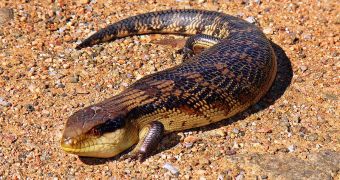Global warming effects have been linked to a wide series of disturbing facts, like environmental degradation and unwanted changes applied to wildlife species.
It may not come as a surprise that climate change triggers weird, destructive natural phenomena, while making most of the animals shrink.
However, to complete the chain of odd discoveries, a team of researchers has indicated that global warming may actually make reptiles smarter.
Experts have reached this conclusion after increasing incubation temperature for the eggs of Bassiana duperreyi, a species of skinks living in Australia.
After the eggs hatched, researchers performed a series of tests, suggesting that warmer temperatures favor the development of this species of reptiles. Their findings are published in Biology Letters.
“We have 16 to 17 years of data on the effects of incubation temperature on skinks. We know the hotter guys are bigger, faster, absorb more [egg] yolk.But hardly anyone has given a look at the effect on reptile learning,” explained herpetologist Joshua Amiel from University of Sydney, one of the leading experts involved in this study.
Reptiles are known as cold-blooded creatures that rely only on sunlight to preserve their body temperature. This has prevented scientists from measuring their level of intelligence, through tests.
Amiel and other members of his team have conducted simple tests, revealing the difference between cold and warm incubation. Currently, researchers assume that increased temperatures impact the hormone production controlling the development of reptilian brains.
They placed a flower pot at the end of a rectangular tube, used by lizards to hide, and then they blocked one of the entrances. Afterwards, they used the set to see if these creatures could find their way out.
After taking into consideration the time spent by each creature to complete the task, the crew established that cool-incubated species are less capable of solving the puzzle.
This kind of abilities is essential for creatures living in the wild. This discovery could highlight one of the first beneficial changes attributed to climate change effects so far. The team plans to conduct several other tests to verify the accuracy of their finding.

 14 DAY TRIAL //
14 DAY TRIAL //